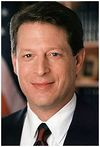Al Gore: Difference between revisions
| Line 42: | Line 42: | ||
==Gore and the Internet== | ==Gore and the Internet== | ||
As a politician, Al Gore has been instrumental in the development of Information Technology in the U.S. As Senator he was responsible in the legislation of the High Performance Computing Act which he call the "Information Superhighway which calls for the development of a national high-speed computer network that would link the industry, government, libraries and universities' computers.<ref>[http://www.nytimes.com/1992/11/10/science/clinton-to-promote-high-technology-with-gore-in-charge.html?pagewanted=4&src=pm | As a politician, Al Gore has been instrumental in the development of Information Technology in the U.S. As Senator he was responsible in the legislation of the High Performance Computing Act which he call the "Information Superhighway which calls for the development of a national high-speed computer network that would link the industry, government, libraries and universities' computers.Gore held the authority and responsibility to lead and coordinate the Clinton Administration's Information Technology Policies to government and research agencies.<ref>[http://www.nytimes.com/1992/11/10/science/clinton-to-promote-high-technology-with-gore-in-charge.html?pagewanted=4&src=pm | ||
==References== | ==References== | ||
Revision as of 05:33, 19 June 2011
 |
 |
| Country: | USA |
| Website: |
Al Gore is the 45th Vice President of the United of America under the administration of President Bill Clinton. He is the Chairman and co-founder of Generation Investment Management and Alliance for Climate Protection. During his term as Vice-President, He led an inter-agency group which oversees the coordination of the US government's strategies on electronic commerce. Among the strategies implemented by the Bill Clinton Administration was the creation of ICANN.
Early Life
Al Gore was born Albert Arnold Gore Jr. on March 31, 1948 in Washington D.C. He was the second child of Albert Gore Sr., Senator from Tennessee and Pauline LaFon Gore, one of the first woman lawyer from Vanderbilt Law School.[1] He spend half of his childhood years at their family farm in Carthage, Tennessee and at the Washington's Family Hotel Suit 809. His sister Nancy is ten years older and a lawyer. Al Gore considered their family farm steward William Thompson as part of his family.[2]
As a young boy he spent most of his time around old people at the Hotel. He played Frisbee with his friends at the hotel's flat roof or they would drop water balloons on parked limousines limousines or on the hood of cars waiting to change lights.He was described as a perfect little gentleman, uncommonly earnest or courteous to his elders. His school friend Barbara Howar also describe the young Al Gore as an "egregious little tattletale."[3]
He received strict mentoring about political issues from his father everyday. Her mother also uses dinner conversation as an opportunity to train young Al to participate in discussions on issues appropriate to his age. His parents made sure that he would rise and succeed in politics.[4]
Marriage
He was married to Elizabeth "Tipper" Aitcheson, on May 19, 1970 at the Washington Cathedral. They have four children Karenna, Kristin, Sarah and Albert and three grandchildren. The couple separated after 40 years of marriage on June 1, 2010.[5]
Education
Al Gore graduated High School at St. Alban's Episcopal School for Boys in Washington. He earned his Bachelors Degree in Government at Harvard University in 1969. He studied Course of Work at the Vanderbilt University Divinity School under a Rockefeller Foundation between 1971 to 1972 and eventually attended the Vanderbilt Law School in 1974-1976. [6]
Military Service
In August of 1968, at the age of 20 Al Gore enlisted in the U.S.Military for two years and received his basic training at Fort Dix. He was assigned as Public Affairs Officer at Fort Rucker, Alabama. He served a non-combatant position as a reporter during the Vietnam war to cover the operations activities of the 20th Engineer Brigade at Bien Hoa, Southern Vietnam for five months.[7]
Political Career
After returning from his assignment as a reporter for the 20th Engineering brigade during the Vietnam War in 1971, Al Gore decided as a journalist for Nashville Tennessean to write news stories and editorials on policy and metro government. In 1976, he entered politics joined the race for a Congressional seat for the Fourth District of Tennessee after veteran Congressman Joe Evins retired. He conducted around 1,200 town hall meetings. On November 2 that year, Gore was elected Congressman.[8] He served as a House Representative for three terms until 1982.
In 1983, Al Gore run for the Senate seat left by Tennessee Senator Howard Baker. He won the election by 60% majority vote from his constituents on November 6, 1984 and re-elected in 1990.[9]
In 1992, Bill Clinton picked Gore to become his vice-presidential running mate.The tandem won the election. Bill Clinton became the 42nd President of the United States while Al Gore the 45th Vice-President of the United States.[10] Political Consultan Dick Morris described Gore as the most powerful Vice president in history.[11] In 1996, Clinton and Gore served their second term as President and Vice-presidents of the the country.
In 2000, Gore was nominated by the Democratic Party as presidential candidate however, he lost the election to then Texas Gov. George W. Bush.[12]
Gore and the Internet
As a politician, Al Gore has been instrumental in the development of Information Technology in the U.S. As Senator he was responsible in the legislation of the High Performance Computing Act which he call the "Information Superhighway which calls for the development of a national high-speed computer network that would link the industry, government, libraries and universities' computers.Gore held the authority and responsibility to lead and coordinate the Clinton Administration's Information Technology Policies to government and research agencies.<ref>[http://www.nytimes.com/1992/11/10/science/clinton-to-promote-high-technology-with-gore-in-charge.html?pagewanted=4&src=pm

